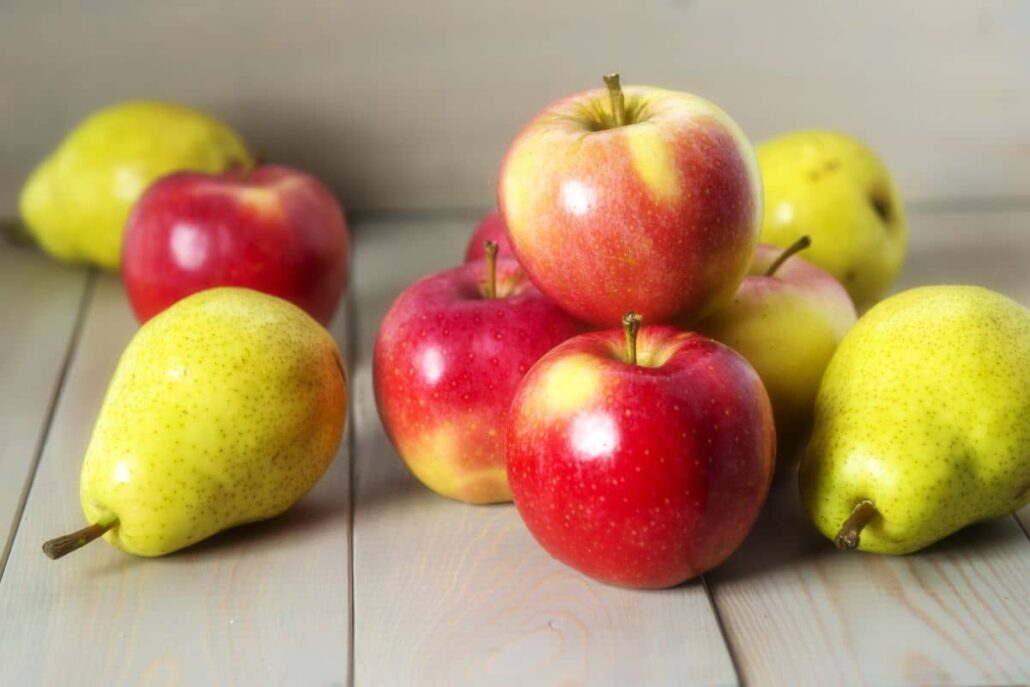Pollen allergies do not just cause sneezing and itchy eyes—they can also affect what you eat. Many people with seasonal allergies experience symptoms when they eat certain fruits, vegetables, and nuts, even if those foods are healthy and fresh. This reaction is often caused by a condition known as oral allergy syndrome (OAS), also called pollen food allergy syndrome (PFAS). It happens when a part of the proteins in some foods are similar to the proteins in pollen. If you have OAS, knowing what grass, ragweed or birch pollen allergy foods to watch out for can help reduce symptoms and protect your health.
At Becker ENT & Allergy, our team of board-certified allergists helps patients across New Jersey and the Philadelphia area understand how their pollen allergies may impact food choices. In this guide, we explain which foods to watch out for, how to tell the difference between mild and severe allergic reactions, and why seeing a specialist is an important step in staying safe.

What to Know About Pollen Allergies and Food Reactions
- People with seasonal allergies can react to certain raw fruits, vegetables, and nuts.
- This condition is called oral allergy syndrome (OAS), or pollen food allergy syndrome (PFAS).
- The proteins in some foods mimic pollen proteins, leading to a reaction.
- Cooking or peeling the food can reduce symptoms in some cases.
- An allergist can help confirm your triggers and offer treatment options.
Why Pollen Allergies Can Affect What You Eat
If you suffer from seasonal allergies, your immune system is already on high alert when it comes to pollen. But for many, those same reactions extend beyond the outdoors and into the kitchen. That’s because certain parts of the proteins in fruits, vegetables, and nuts are so similar to the proteins in pollen that your body reacts as if you’ve just inhaled tree pollen or grass.
This cross-reactivity leads to oral allergy syndrome, which causes itching, tingling, or mild swelling in the mouth, lips, or throat. According to the American Academy of Otolaryngology—Head and Neck Surgery, PFAS (OAS) affects up to 70% of people with birch pollen allergy, making it a common but often underdiagnosed condition. Tree pollen, grass pollen, and ragweed are the usual culprits.
OAS vs. Anaphylaxis: Know the Difference
While oral allergy syndrome is usually mild, it is important to know the difference between OAS and anaphylaxis, a severe and potentially life-threatening allergic reaction.
OAS typically causes:
- Itchy or tingling lips, mouth, or throat
- Mild swelling of the lips or tongue
- Symptoms that go away quickly after eating
Anaphylaxis, on the other hand, can cause:
- Trouble breathing
- Swelling of the throat or face
- Hives, dizziness, or a drop in blood pressure
- Nausea or vomiting
- Loss of consciousness
If you are unsure which one you are experiencing, do not guess—seek emergency care. An allergist can help identify your risk for severe reactions and determine if you need an epinephrine auto-injector.
Why Seeing an Allergist is Essential
Not all food reactions are dangerous, but they can be uncomfortable and confusing. Seeing a board-certified allergist at Becker ENT & Allergy allows you to help pinpoint the exact cause of your symptoms. By carefully reviewing your allergy history, performing diagnostic tests, and guiding you through supervised food challenges when needed, our specialists can identify whether your symptoms stem from a food allergy, pollen allergy, or both.
Becker ENT & Allergy offers comprehensive allergy evaluations that include state-of-the-art diagnostic testing and individualized treatment strategies. We are committed to helping patients of all ages manage food and environmental allergies with confidence and clarity.
Allergy care at Becker ENT & Allergy is tailored to your individual needs. Whether you need guidance on dietary changes, prescription treatment, or immunotherapy options like allergy shots, we’re here to help you take control of your symptoms.
Pollen Allergy and Foods to Avoid
If you have OAS, your symptoms are usually related to raw foods, especially when eaten during allergy season. Cooking often breaks down the proteins that cause reactions, making foods easier to tolerate. Here’s a list of common foods associated with specific pollen allergies.

Birch Pollen Allergy Cross Reactivity Foods
People with birch pollen allergy may react to:
- Apples
- Pears
- Cherries
- Peaches
- Plums
- Apricots
- Carrots
- Celery
- Hazelnuts

Grass Pollen Allergy Cross Reactivity Foods
People with grass pollen allergies often react to:
- Melons (e.g., cantaloupe, watermelon, honeydew)
- Oranges
- Tomatoes
- White potato

Ragweed Pollen Allergy Cross Reactivity Foods
If you’re allergic to ragweed, avoid these foods:
- Bananas
- Cucumbers
- Zucchini
- Melons

Mugwort Allergy Cross Reactivity Foods
Mugwort allergies may cause reactions with:
- Carrots
- Celery
- Coriander
- Fennel
- Broccoli
A proper diagnosis is the first step toward a symptom-free life
Don’t wait! Schedule your allergy evaluation with Becker ENT & Allergy in Philadelphia or New Jersey.
Common Food Additives to Be Cautious Of
In addition to fresh produce, some packaged foods may contain natural ingredients or additives that cause problems. These may include:
- Natural flavorings derived from celery or nuts
- Preservatives in dried or processed fruits
- Spices such as coriander, parsley, and fennel
- Natural food colorings that can contain cross-reactive proteins
Reading labels carefully and choosing minimally processed foods can help reduce the risk of accidental exposure.
How to Manage Oral Allergy Syndrome Safely
If you have oral allergy syndrome, there are several steps you can take to manage your condition and reduce symptoms:
- Avoid raw forms of foods that trigger reactions
- Try peeling or cooking fruits and vegetables before eating
- Rinse fresh produce thoroughly to remove surface pollen
- Keep a food diary to track which items cause symptoms
Most importantly, don’t guess when it comes to your health. Work with a specialist to develop a plan that keeps you safe and informed.
Why Choose Becker ENT & Allergy
Becker ENT & Allergy is one of the leading practices in the region for diagnosing and treating allergies of all types. Our team includes board-certified allergists and ENT specialists who are experts in managing complex allergy cases, including food allergy and pollen food allergy syndrome.
With convenient locations throughout New Jersey and Pennsylvania, we offer advanced diagnostic testing, personalized treatment plans, and compassionate care. Whether you are struggling with seasonal allergies, asthma, or food-related symptoms, we provide clear answers and effective solutions.
Consult with Allergy Experts in Philadelphia and New Jersey
Take control of your symptoms with expert help from Becker ENT & Allergy. Whether you are unsure what foods are triggering your reactions or you are looking for long-term relief from seasonal allergies, our board-certified specialists can guide you every step of the way. With convenient locations throughout New Jersey and the Philadelphia area, personalized care is just a call or click away. Schedule your consultation today and start feeling better tomorrow.

